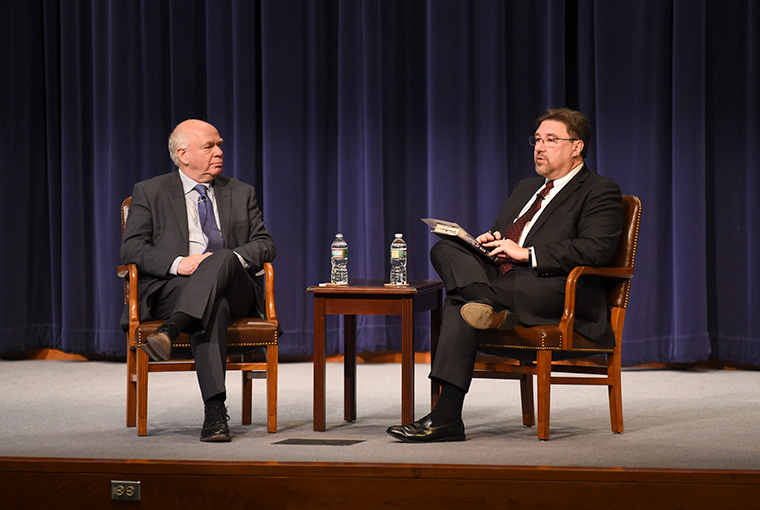War strategist: Beware fallacy of decisive 1st strike

British military strategist Sir Lawrence Freedman spoke to U.S. Naval War College students Tuesday on the subject of his recent book, “The Future of War: A History.”
Freedman is an emeritus professor of war studies at King’s College London. He is an expert on Cold War and nuclear strategy and is Britain’s official historian of the Falklands War.
He also served on the British inquiry into that nation’s role in the Iraq War.
Asked for his advice to active-duty officers as they hone their strategic thinking, Freedman said what’s needed is a flexible mind.
“The real challenge for strategists is not to know what’s coming and have prepared for it, because you are bound to get that wrong. But to have a habit of mind that allows you to see opportunities and possibilities and dangers in a developing situation,” Freedman told the audience.
“The key attribute to be a good strategist is adaptability, empathy, flexibility of mind and to keep a situation under assessment, under evaluation.”
After studying the Iraq War and its fallout, Freedman said one lesson is that there are basic questions that must be considered by war planners.
“One of the things you’ve got to ask is, what are the limitations of armed force?
“Much of the writing on the future of war assumes that a really clever enemy, or sometimes the really clever us, is going to find some means by which they get in the first blow that will be decisive. If there’s one recurring theme in my book, it’s that fallacy,” he said.
Whether it’s the nuclear first strike or the cyberattack that will turn the lights off, Freedman said, planners need to pay close attention to the next steps.
“And then what? You have to ask the questions about the third and fourth blows. How are people going to react? How important is territory in all this? Can you win a war if you aren’t taking territory? If you are taking territory, what about the people living there?” Freedman told the audience.
“Those are the recurring issues of the last few decades.”
In an interview after the discussion, Freedman said his book is an intellectual history of how nations and war strategists have thought about the future.
“I was also trying to contextualize some of the current debate. It’s always important to know where these ideas come from,” he said.
Where, for example, did the current discussions of cyber warfare, information warfare and hybrid war come from?
“I think it’s helpful because otherwise these things just become clichés,” Freedman said. “Whereas if you see where they’ve come from, you see their faults and their problems.”
The British strategist’s next book, “Ukraine and the Art of Strategy,” looks at the repercussions of Russia’s 2014 invasion of Crimea.
Freedman said the invasion has become a quagmire for Russia.
“They’ve got bogged down. I don’t think they can take it much further,” Freedman said in the interview.
“I don’t think (Russian President Vladimir) Putin’s got some great plan to get out. He can put pressure on Ukraine, but unless he’s prepared to invade – which I don’t think he is, for all the reasons we discussed about why invasions are difficult – I think he’s a bit stuck.
Freedman’s talk was part of the Knox Lecture Series of the college’s Hattendorf Historical Center.
